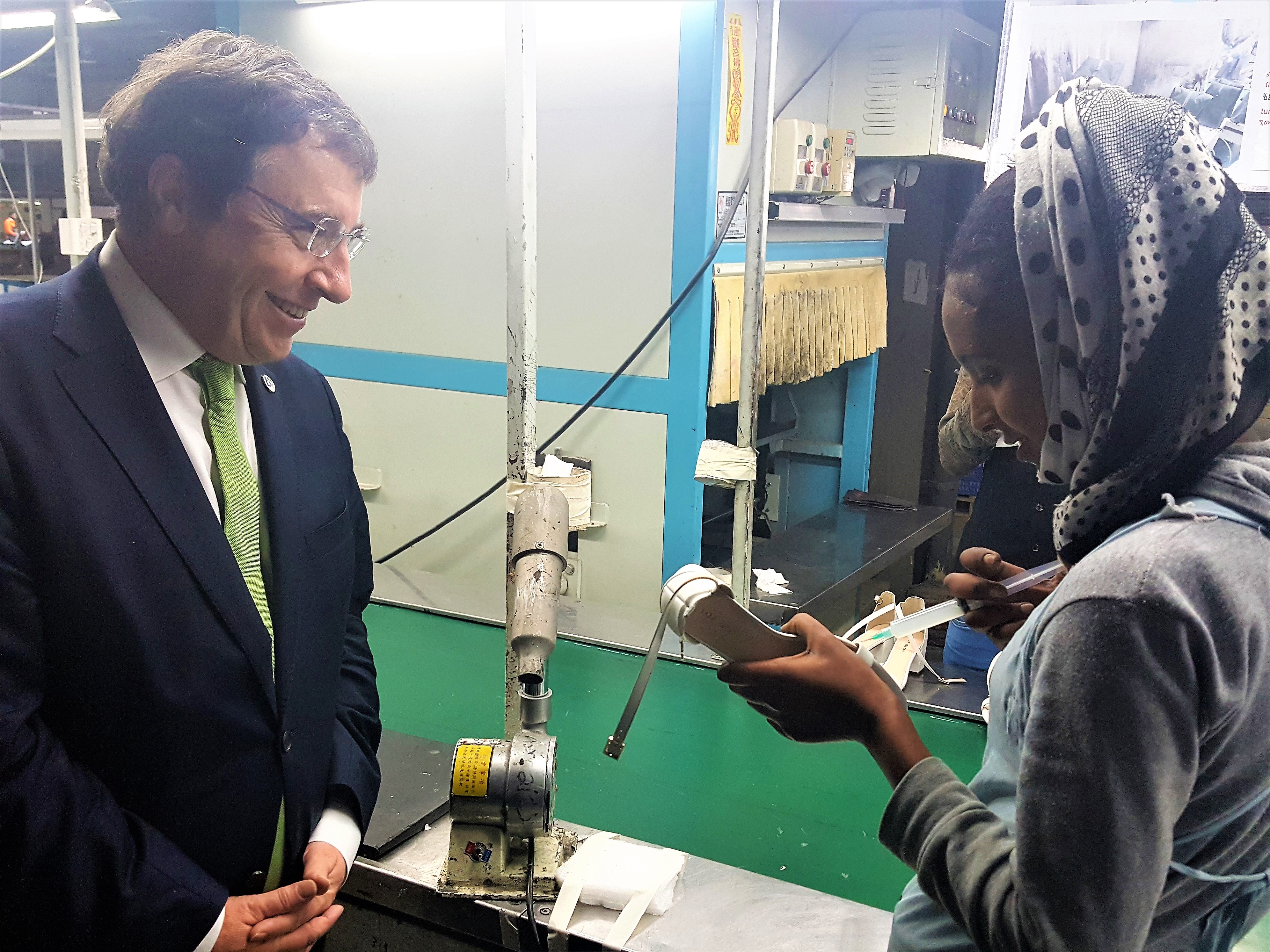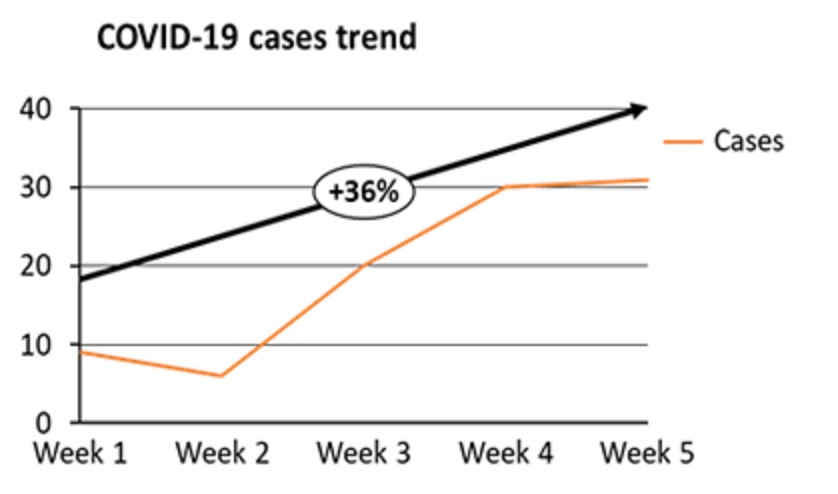 (UNDP Administrator Achim Steiner visiting Bole Lemi Industrial Park in Ethiopia)
(UNDP Administrator Achim Steiner visiting Bole Lemi Industrial Park in Ethiopia)
On March 13th, two days after WHO confirmed COVID-19 as a global pandemic, the first case of the virus was confirmed in Ethiopia by the Ministry of Health. Immediately, UNDP Ethiopia changed gear directing all its energies and resources in support of the response, as did UNDP country offices everywhere else. At the Accelerator lab, we were not left behind. We quickly shifted gear too, joined the effort in supporting the country to fight the pandemic. Our focus was three-fold: support the government, within the broader framework of UNDPs COVID-19 Offer, to ensure that key agencies have the preparedness, adaptability and business continuity plans in place for COVID-19 and that they can continue providing critical function, and two, that we could mobilize the tech community in Ethiopia to come up with innovative responses around surveillance, tracking and community action against the pandemic. The third pillar of our response relates to assessing and understanding the socio-economic impact of the pandemic in and around the budding industrial parks to reinforce the public health response, by minimising the impact of COVID-19 on low-income workers that hold a lot of promise for the country and who account for a significant proportion of Ethiopia’s industrial workforce.
Ethiopia and the pandemic
As of 2nd May 2020, there are 133 confirmed cased, in 7 of the 9 regions with 35% of the cases not having any travel history. While the number is relatively low, it is increasing every day and there is great concern that vulnerable populations will be greatly affected not just by the virus but by the impact it will have on many aspects of life. To prevent this as much as possible, multiple measures such as providing handwashing and sanitizing facilities in public areas, working from home measures for those with the ability, mandatory quarantine for all travellers, closing of borders and social distancing policies have been adopted under the state of emergency. However, the pandemic is now more than a health crisis, it is putting large portions of the population who are already vulnerable in even more danger by affecting businesses and livelihoods significantly. 
According to UNECA, COVID-19 is estimated to reduce the economic growth in Ethiopia by 2.9% as a likely result of the indirect shock to the economy such as slowing down of the global market and plummeting commodity prices. This reduction in GDP will reduce the revenue of the government in taxes and could contribute to an increase in inflation. The impact on the airline industry will be felt enormously with Ethiopian airlines having the highest traffic in the continent and the reduction in tourism and travel will affect Ethiopia’s access to foreign currency. This will hinder the country’s ability to pay debts and import goods. Therefore, at the macroeconomy level, Ethiopia’s government has passed a decision to allocate ~150m USD dollar as an economic stimulation package (FAO-IFAD-ILO-UNDP-UNIDO Socio-economic impact analytical framework for Ethiopia, unpublished). This is intended to consider, loan access and repayment period extension to the industry businesses. In additions, the World Bank has approved $82.6 million to aid the country in the mitigation of COVID-19.
Industrial parks (IP) preparedness towards the pandemic and potential social and economic impacts
For the past 5 years, Industrial parks have not only offered Ethiopia a way to build a sustainable economic growth with a greater contribution from manufacturing (4.3% GDP contribution in 2016), but also a way to create address unemployment. The Industrial park development corporation operated 9 parks around the country that are occupied by foreign companies that bring foreign direct investment and have employed around 65,000 Ethiopians. However, the pandemic is threatening the momentum built up by the industrial parks with impending closures and reduction of production due to the slowdown of the global market. The Job Creation Commission estimates that over the next 3 months 1.1 million jobs will be threatened in the manufacturing and construction sector alone in Ethiopia due to the sock on the demand and supply side.
Therefore, the accelerator lab wanted to understand how IPs are responding to the pandemic, identify gaps and challenges they are facing, and get a quick overview of socioeconomic implications. To do this we reached out to 7 industrial parks representative and employees on to identify emerging signal on the impact COVID-19, what preventative measure has been taken by the park, companies and employees. Both the economic and well-being of the workers were out on the spotlight.

From the quick situational assessment, we learned that:
· There parks have taken many initial steps in providing preventative measure but are facing potential supply problems when it comes to equipment like temperature scanning.
· There haven’t been enough quarantine facilities established in all parks and all don’t have enough health facilities
· There has been a language barrier between the companies and employees, which has resulted in miscommunication on safety at work
· Tracing employee’s care after work is a challenge.
· Some companies have repurposed their regular production into other related protective equipment
· Employees that are still working are worried about more closures and not being able to support their families
· There has been little or no psycho-social support provided to the workers to safeguard their wellbeing
Social and economic implications of the closure of the industrial parks in response to the COVID-19
The industrial park’s operation is not only dependent on the local market dynamics, but also on the global trends of the pandemic, where the destination markets (the USA, Europe and China) are hit the hardest. Therefore, both the export of goods and import of raw materials by the IP companies are jeopardized. This will force companies to cut production and put employees on leave. We spoke to an employee at an Industrial park near the capital who along with 600 of her co-workers were on paid leave because the company couldn’t source its raw material from china anymore. On the other hand, a garment manufacturer in Hawassa IP had more than 70 of its orders cancelled by its buyer and was forced to put employees on leave because there was no work. These problems, which are the indirect implication of the virus will have serious consequence for the employees, companies, industrial park corporation and the country. The future wheel below explores some of the possible implications of a prolonged lockdown we established during our weak and strong signal identification calls.

UNDP’s immediate medium term offer in support of the Industrial Parks
To mitigate the impact of the pandemic in and around industrial parks, UNDP is providing targeted assistance in three areas: first, supporting the health of workers by providing equipment and suppliers (masks, infrared temperature measurement, sanitizers, and so on. The procurement for this is underway with an investment of over $500,000. Secondly, it will support awareness and providing training and psycho-social support to workers to safeguard their wellbeing and prevent transmission, and thirdly, within the framework of the business continuity planning project, support the IPDC to keep the parks running and ensuring that supply and logistics chains continue to operate, even if at a lower level of capacity.
In the medium term, UNDP working through the Accelerator Lab is planning to partner with Viamo, a private tech company, to support the industry with touchless awareness maintenance and real-time data collection that serves as an early warning system to help the industrial parks remain a safe working environment and operational. Based on what we have observed in the assessment, we are planning to work with Viamo to:
· perform a perception survey on the mobile phone to understand IP employees activate to protect themselves and families form the virus while they are working;
· Design a behavioural change centred education campaigns in two ways (IVR, SMS and hotlines) for employees;
· In addition, we are sourcing local innovation through the joint COVID-19 challenge fund launched by UNDP Ethiopia and the Ministry of innovation and technology (MInT) that could be experimented and scaled in the industrial park context.
The accelerator lab will filter out the industry support relevant innovative solutions and get them tested according to our learning cycle.

 Locations
Locations
